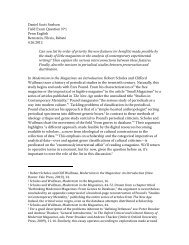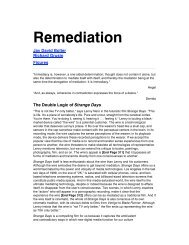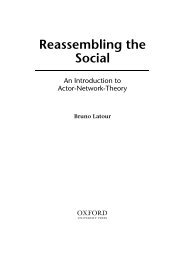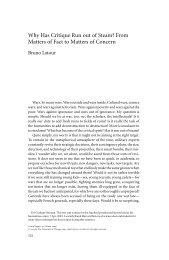The Exploit: A Theory of Networks - asounder
The Exploit: A Theory of Networks - asounder
The Exploit: A Theory of Networks - asounder
Create successful ePaper yourself
Turn your PDF publications into a flip-book with our unique Google optimized e-Paper software.
Edges 117<br />
tension, duration, and intensity <strong>of</strong> the illnesses prevalent in a population....Death<br />
was now something permanent, something that slips<br />
into life, perpetually gnaws at it, diminishes it and weakens it.” 18 It is<br />
clear that, in this context, there is no end to biological security; its<br />
job is never finished and, by definition, can never be finished. If there<br />
is one site in which the state <strong>of</strong> emergency becomes the norm, it is<br />
this site <strong>of</strong> nondistinction between war and disease, terrorism and<br />
endemic.<br />
Network Being<br />
Information networks are <strong>of</strong>ten described as more than mere tools or<br />
relations, but rather as a “global village” or a “collective consciousness.”<br />
What is it about networks that impels us to describe them as<br />
somehow being alive? For Heidegger, however, the question <strong>of</strong> being<br />
and the question <strong>of</strong> being alive are two different things. Too <strong>of</strong>ten an<br />
inquiry <strong>of</strong> being alive presupposes the self - evident existence <strong>of</strong> being.<br />
<strong>The</strong> fields <strong>of</strong> anthropology, psychology, and biology begin their analyses<br />
on the question <strong>of</strong> “life itself,” its modalities and characteristics,<br />
its laws and behaviors, its properties and taxonomies. Rarely do they<br />
ever inquire into the existence as such <strong>of</strong> “life itself,” the almost confrontational<br />
factuality <strong>of</strong> the being <strong>of</strong> life (what Levinas described as<br />
the impersonal “horror <strong>of</strong> the ‘there is’ . . .”). As Heidegger notes, “In<br />
the question <strong>of</strong> the being <strong>of</strong> human being, this cannot be summarily<br />
calculated in terms <strong>of</strong> the kinds <strong>of</strong> being <strong>of</strong> body, soul, and spirit which<br />
have yet first to be defined.” 19<br />
But it is precisely this question that the sciences <strong>of</strong> life jump over,<br />
in favor <strong>of</strong> exclusively anthropomorphic inquiries <strong>of</strong> psychology or<br />
biology. “Life itself ” is always questioned, but the existence as such <strong>of</strong><br />
life, the being <strong>of</strong> life, is not regarded as a problem. Such knowledge—<br />
as in the life sciences—thus continues with an assumption <strong>of</strong> having<br />
understood the very existence as such <strong>of</strong> living beings. One begins<br />
with Darwinian evolution, with developmental genetics, with studies<br />
<strong>of</strong> biological morphogenesis, with the genetic factors in health and<br />
disease. “<strong>The</strong> ontology <strong>of</strong> life takes place by way <strong>of</strong> a privative interpretation.<br />
It determines what must be the case if there can be anything<br />
like just - being - alive.” 20 <strong>The</strong> life sciences thus become, in this









